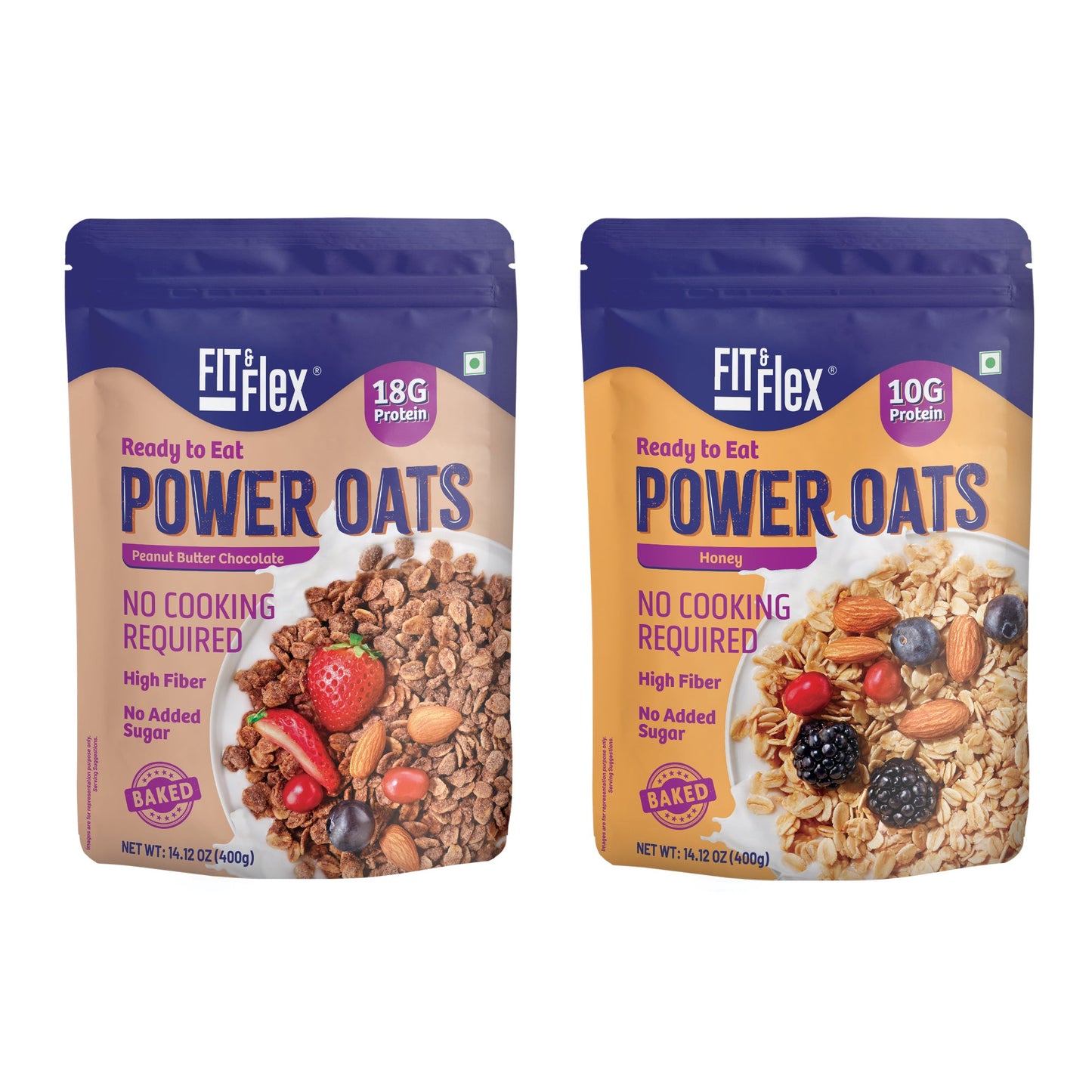Why ROLLED OATS !?

1. Rich in Nutrients:
Rolled oats are packed with essential nutrients that support overall health. They are an excellent source of complex carbohydrates, which provide a steady release of energy to fuel your day. Additionally, rolled oats contain fiber, both soluble and insoluble, which supports digestive health and helps regulate blood sugar levels. They also provide a significant amount of protein, which is essential for muscle repair and growth, as well as various vitamins and minerals such as iron, magnesium, phosphorus, and B vitamins.
2. Easy to Digest:
The process of steaming and rolling oat groats into rolled oats makes them more digestible compared to other forms of oats. This gentle processing method breaks down the oat's starches, making them easier for your body to break down and absorb. As a result, rolled oats are often well-tolerated by individuals with sensitive stomachs or digestive issues.
3. Versatile in Cooking:
Rolled oats can be used in a wide variety of dishes, making them a versatile pantry staple. They are most commonly used to make oatmeal, a warm and comforting breakfast option. However, rolled oats can also be incorporated into granola, baked goods like cookies and muffins, savory recipes like meatloaf or veggie burgers, and even smoothies. Their neutral flavor and soft texture make them adaptable to both sweet and savory dishes, allowing for endless culinary creativity.
4. Texture and Mouthfeel:
When cooked, rolled oats have a satisfying chewy texture that adds a pleasant mouthfeel to dishes. This texture makes oatmeal a hearty and comforting breakfast option, providing a sense of satiety and satisfaction. In addition to their texture when cooked, rolled oats can also be ground into oat flour, which provides a tender crumb in baked goods and helps bind ingredients together.
5. Promotes Satiety:
The combination of fiber and protein in rolled oats contributes to feelings of fullness and satisfaction after eating. This can help prevent overeating and support weight management goals by keeping you feeling satisfied for longer periods. Incorporating rolled oats into your meals and snacks can help curb hunger cravings and reduce the likelihood of reaching for less nutritious options.
6. Heart-Healthy Benefits:
One of the most well-known benefits of rolled oats is their heart-healthy properties. Rolled oats contain beta-glucan, a type of soluble fiber that has been shown to help lower cholesterol levels by reducing the absorption of cholesterol into the bloodstream. Regular consumption of rolled oats has been linked to improved heart health and a reduced risk of cardiovascular disease. Additionally, the fiber content in rolled oats helps regulate blood sugar levels, which is beneficial for overall metabolic health.
FAQ's
Q1. Are rolled oats gluten-free? Rolled oats themselves are gluten-free, but they may come into contact with gluten-containing grains during processing. To ensure they are gluten-free, look for certified gluten-free rolled oats.
Q2. Can rolled oats help with weight loss? Yes, rolled oats can aid in weight loss due to their high fiber and protein content, which helps promote feelings of fullness and satiety, leading to reduced calorie intake.
Q3. Are rolled oats suitable for a low-carb diet? Rolled oats are relatively high in carbohydrates, so they may not be suitable for strict low-carb diets like keto. However, they can be incorporated into a balanced diet in moderation.
Q4. Can rolled oats be eaten raw? While rolled oats can be eaten raw in dishes like overnight oats or muesli, they are typically cooked before consumption to improve digestibility and enhance flavor.
Q5. Do rolled oats have to be cooked before eating? Rolled oats should be cooked before eating to soften them and make them more digestible. However, they can also be soaked overnight and eaten raw in dishes like overnight oats.
Q6. Are instant oats the same as rolled oats? Instant oats are similar to rolled oats but have been pre-cooked and rolled thinner for quicker cooking. They may have a slightly different texture and nutrient profile compared to traditional rolled oats.
Q7. Can rolled oats be used as a substitute for flour in baking? Yes, rolled oats can be ground into oat flour and used as a substitute for wheat flour in baking recipes. Oat flour adds a nutty flavor and moist texture to baked goods.
Q8. Are rolled oats suitable for people with diabetes? Rolled oats have a lower glycemic index compared to refined grains, making them a better choice for managing blood sugar levels. However, portion control is still important for people with diabetes.
Q9. How long do rolled oats last? When stored in an airtight container in a cool, dry place, rolled oats can last for up to one year. However, they may lose flavor and nutritional value over time, so it's best to use them within a few months for optimal freshness.
Q10. Can rolled oats be used in savory dishes? Yes, rolled oats can be used in savory dishes like soups, stews, and meatloaf to add texture and nutrition. They can also be used as a binder in veggie burgers or meatballs.
In summary, rolled oats are a nutritional powerhouse that offers a wide range of health benefits. From their rich nutrient profile to their versatility in cooking, rolled oats are a versatile and delicious ingredient that can be enjoyed in countless ways. Whether you prefer them in a warm bowl of oatmeal, crunchy granola, or as a binding agent in your favorite recipes, rolled oats are a wholesome addition to any diet.




